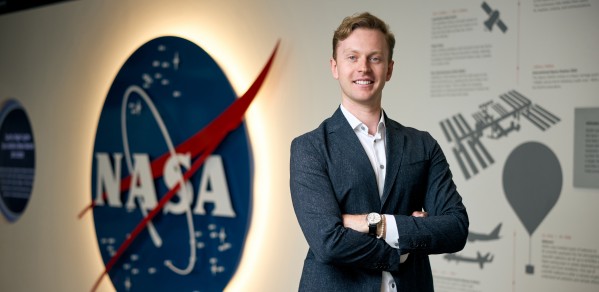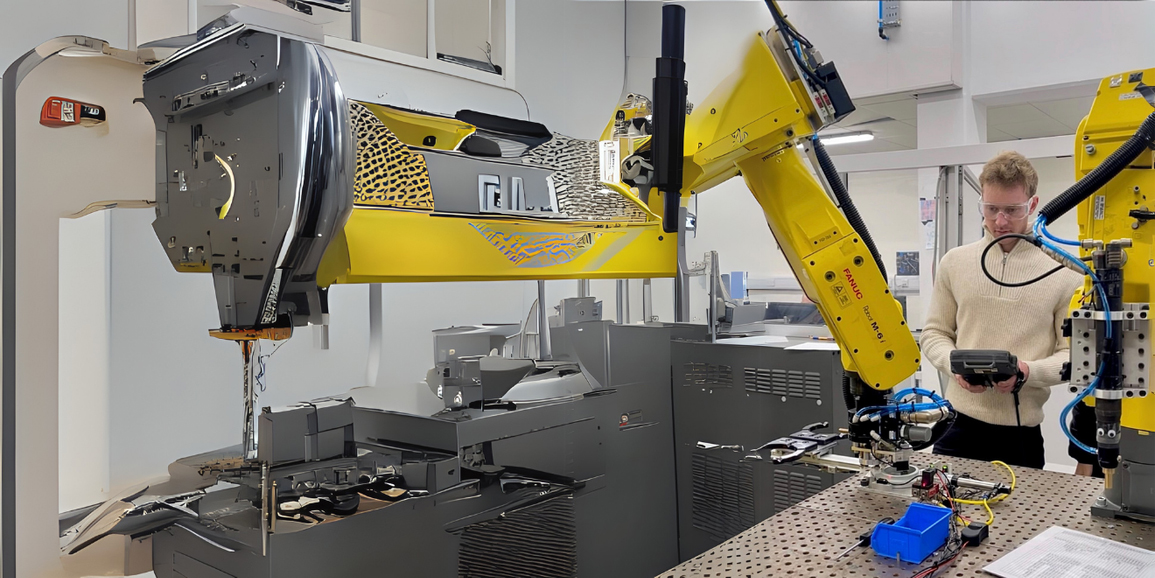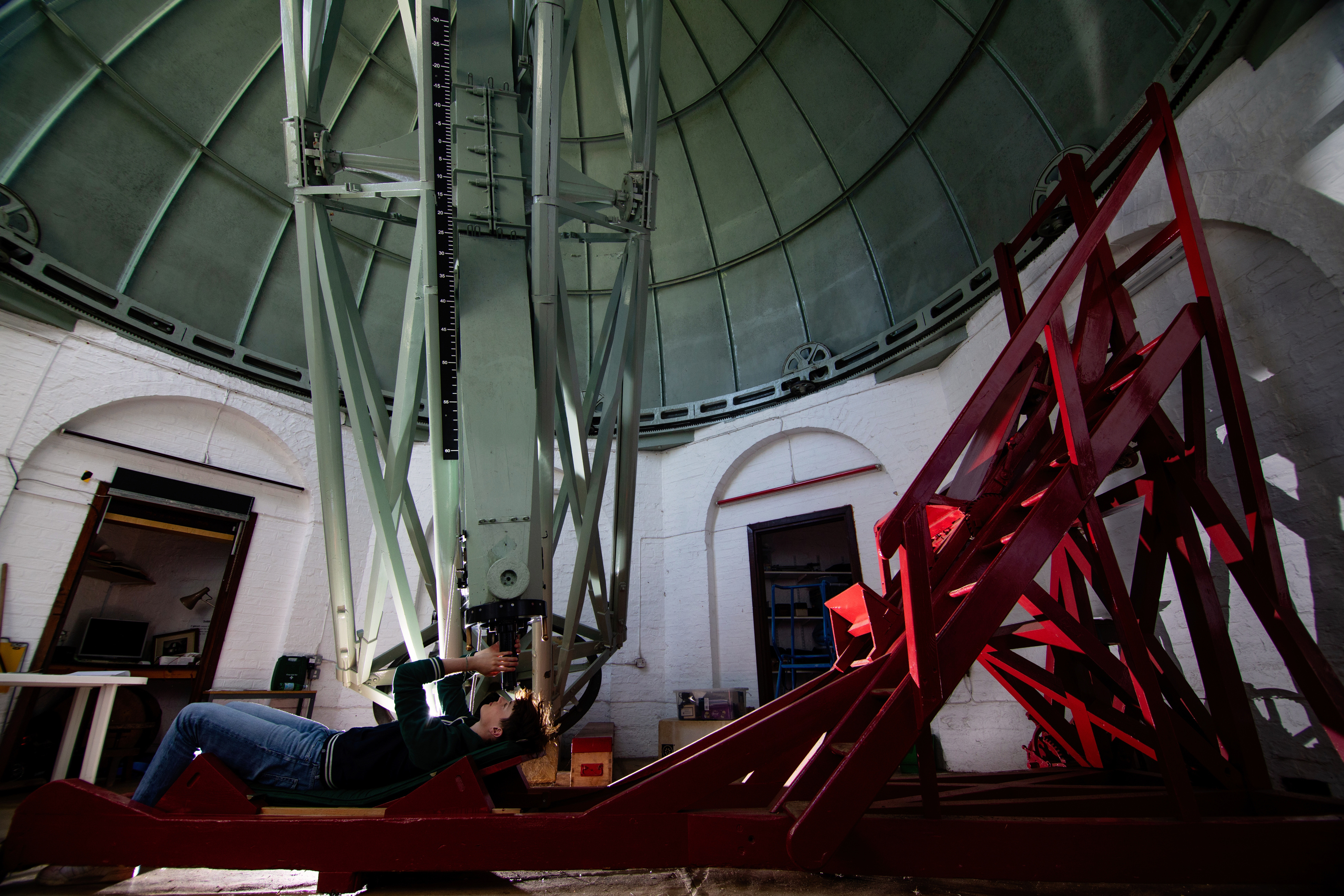
As a child growing up in New Jersey, Lane Painter was fascinated by robots of all kinds. He was curious about how they worked, how they were built, and most importantly, what they might do.
Lane joined the MPhil in Industrial Systems, Manufacturing and Management during which he tackled live engineering challenges with over 30 companies across Europe and Asia, traveling to apply what he learned first hand.
A journey to NASA
Today, that same interest drives him as he advances robotic missions on Mars at NASA. His path to the forefront of space exploration began with an unexpected pivot: from studying Economics, to doing Engineering at Cambridge.
Now based in Washington DC, Lane works at NASA Headquarters on the Mars Exploration Programme, where he helps steer the future of robotic science missions. It's a role that blends strategy, technology, and an enduring sense of curiosity.
So how does someone with a degree in economics end up at the heart of space innovation? As Lane puts it: “So much of what I do now stems from my time at Cambridge.”
"Cambridge offered me the ideal environment to reimagine what I could do."
Shaping a new path
While earning his Economics degree, Lane spent a formative stint working in a human-robot interaction lab at the University of Chicago. This sparked his move to Cambridge in 2022, where he joined the MPhil in Industrial Systems, Manufacturing and Management: a course that proved pivotal to his future.
His Master’s cohort was made up almost entirely of engineers from around the world, bringing a diverse range of technical expertise. “I was the only outlier, coming in with an Economics background” Lane recalls.
What began as an academic shift soon became a broader reimagining of his career, as Lane's learning extended far beyond the lecture theatre. “We tackled live engineering challenges with over 30 companies across Europe and Asia, traveling to apply what we learned first hand.”

Image above: Lane in the Automation Laboratory at the Institute for Manufacturing.
Unexpected lessons
Lane was a member of Darwin College, and while his course provided unmatched technical depth, it was the College environment that gave him breadth—as well as inspiration from unexpected places.
“I came to Cambridge expecting rigorous study and academic exploration, but I hadn’t anticipated how rich the College culture would be, and how easy it was to meet people and have meaningful conversations. I was frequently meeting others working on fascinating research across every field, and constantly exposed to new ideas and industries.
“Darwin’s a postgraduate College, so it was really the first time I’d been surrounded by people so immersed in their own research. A lot of my friends happened to be studying Law, and through countless conversations at formal dinners, over coffee, or in College bars, I found myself continually in an environment of learning, often without even realising or expecting it. By the time I left, I had developed a real appreciation for policy that's really stayed with me, thanks in large part to those informal chats.”

Image above: A University of Cambridge student stargazing at the Institute of Astronomy. Copyright: University of Cambridge
Lane also joined the University's Astronomical Society, where he trained to use one of Cambridge’s historic telescopes, giving him access to explore the night sky at any hour.
“My friends and I would ride our bikes out late at night, unlock the telescope, adjust it, and observe the stars. It was magical to be able to view the night sky from Cambridge.” His telescope pass is still taped to his fridge today.
“What I came to realise was that Cambridge offered the ideal mix: policy conversations at Darwin, technical learning with my cohort, and hands-on management and strategy through my course. That blend mirrors the work I do now at NASA. The way I approach problems in the Mars programme was shaped by the foundations laid for me at Cambridge, where learning wasn’t confined to the classroom—it was part of everything, trickling down into every part of my life.”
Mission-driven minds
For Lane, working at NASA is about far more than spaceflight. It’s the depth and diversity of the science, and the people behind it, that continue to inspire him. His role has given him insight into the lesser-known sides of the organisation, from its global collaborations to its impact on life here on Earth.
“People often think of NASA as just spaceships and rocket science, and that’s understandable. But the reality is far more expansive. NASA is made up of countless teams of brilliant, deeply mission-driven people working across a huge range of scientific fields. The research happening here doesn’t just impact other planets or solar systems; it has real potential to improve life on Earth, making it more sustainable, more efficient, and better understood.”
The culture at NASA, Lane adds, is just as remarkable. “It’s incredibly energising to be surrounded by people united by a sense of purpose. There’s a feeling that we’re contributing to something bigger than ourselves, as well as a constant drive to think long-term, to collaborate, and to stay curious. The work is serious, but it’s powered by creativity, purpose and shared ambition.”
Advice for future explorers
Now two years into his role at NASA, Lane makes a point of talking to students interested in Cambridge, STEM, space, or careers that seem just out of reach.
“The truth of the matter is, the path to NASA is not very clear or intuitive, and it's certainly not the same for everyone. I didn't know anybody that was working there whom I might be able to ask questions, so I had to find ways I might be able to add value. Just being interested isn’t always enough; you need persistence, and you need to find your niche.”
He encourages the students he mentors, and potential Cambridge applicants, to be bold. “There are so many different ways in. Where you begin doesn’t limit where you can go. The key is to follow your curiosity and keep building skills and experiences along the way.”
Cambridge, always
What Lane found at Cambridge—curiosity, collaboration, and a culture of learning—still drive his work today. Whether solving problems in the lab or among international colleagues, the spirit of discovery he found at Cambridge continues to guide his approach; proof that the right environment can launch a career, or even a mission to Mars. He still attends Cambridge alumni events where he lives in Washington DC, and says his time at Cambridge remains a grounding force in his life.
“The more time goes by, the more I realise how much of an amazing experience being at Cambridge was—the programme, the cohort, the College, the culture of learning. It permeates every nook and cranny of the city, and it stays with you. There's no other place like it."
This news feature was originally published on the University of Cambridge Alumni Relations website.

